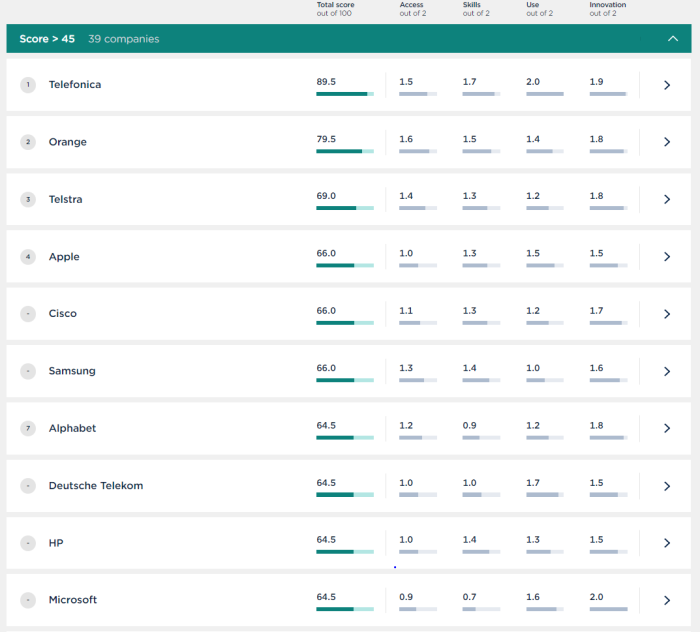See all results of the Digital Inclusion Benchmark
Apple, Cisco, and Samsung jump up the rankings in the latest Digital Inclusion Benchmark

- Benchmark demonstrates tangible commitment from some of the world’s biggest technology companies to further inclusion, though reveals the industry in general is falling short of expectations
- Telecommunications companies—Spain’s Telefonica, France’s Orange, and Telstra from Australia- lead the way for the second year running on digital inclusion thanks to leading practice in teaching digital skills and making the internet more accessible, safe, diverse, and ethical
- Among the top 10, Apple has improved the most, jumping from 14th up to joint 4th in 2021’s assessment
London / Amsterdam, 07 December 2021: For the first time, technology giants Apple Inc., Cisco Systems and Samsung Electronics have broken into the top five ranked companies of the World Benchmarking Alliance’s (WBA) Digital Inclusion Benchmark.
Published today, the second iteration of WBA’s Digital Inclusion Benchmark ranks the 150 most influential technology companies in the world on their progress towards improving access to technology, enhancing digital skills, fostering trustworthy use, and innovating openly and ethically.
In the year since the first benchmark was published, these three companies have made significant progress. Ranked joint fourth, Apple, Cisco and Samsung are leaders in different areas.
Apple stands out for its strong data privacy protection and disclosure as well as support for start-ups from underrepresented groups; Cisco’s flagship Network Academy has trained millions of students around the world in tech skills; and Samsung is distinguished for the range of support it provides to users with disabilities.
There was a notable improvement by a few US-headquartered companies with Alphabet and Microsoft joining the top ten, primarily due to increased disclosure.
However, the tech giants sit behind telecommunications companies who top the ranking – Telefónica (score of 90%, #1), Orange (score of 80%, #2) and Telstra (score of 69%, #3) – these continue to demonstrate leading practice in transparency, support for digital skills and application of trustworthy artificial intelligence.
Lourdes O. Montenegro, Digital Sector Transformation Lead at WBA, said:
The split between telecoms and other technology sectors throws a light on the potential role and impact of sectorial regulation. Telefonica, Orange, and Telstra operate in the heavily regulated telecoms sector. Holding onto the top rankings once again, shows the potential for regulation as a means of doing-away with the unsustainable ‘act first, think later’ mentality.
The benchmark is an opportunity for companies to demonstrate that they are ready to change for the better. If they do not make enough progress on their own, governments, investors, and citizens will need to step up the pressure to hold these companies accountable.
Attitudes must change for an inclusive future
Despite progress at the top of the benchmark, the overall picture is still one of companies falling seriously short of expectations. With an average score of 33 out of 100 across all companies, the sector is lagging in embracing its role in advancing a digital world that brings benefit to all, rather than a fortunate selection of the global population. There is a huge gap in company performance with just 27 companies have a “passing” grade (above 50%) and the remaining 128 failing (score less than 50%).
WBA’s research reveals key insights into the practices of these companies when it comes to their operational side as well as their public impact.
It is not just attitudes towards stakeholders that need to change, but also what companies view as being their responsibility. Their treatment of each element under “ESG” highlights the uneven application of transparency and openness these companies operate under. While most (124 (80%) of this group) disclose environmental data due to increased investor scrutiny and global concern in this area, they are much less transparent about social and governance data. Only 55 companies (35%) disclose information on data breaches and just 31 (20%) reported taxes paid in their countries of operation.
Protecting the most vulnerable
The industry’s COVID-19 response was promising and demonstrates that tech companies can move quickly. As a result of COVID-19, tech companies introduced a range of initiatives supporting digital inclusion in 2020. Actions included increasing data caps, providing laptops to students, and offering free access to government education and health websites. These steps helped millions of people adapt to the new remote environment. Working and learning in the post COVID-19 world will likely be a hybrid real and virtual process and digital companies need to keep these measures in place, particularly for the most vulnerable.
Data protection and child protection policies and practice in particular are areas where the vast majority of companies need to focus on producing swift and meaningful improvements. Just 27 companies have a high-level commitment to child online safety while only 9 companies have fulfilled requirements for high-level oversight of cybersecurity and 7 for managing, monitoring, and reporting on data protection.
Companies need to do more to provide the skills and knowledge for users to be decerning around issues like protecting privacy, or distinguishing between real and fake information,” adds Lourdes O. Montenegro, Digital Sector Transformation Lead at WBA.
The pandemic sped up the integration of the digital world and our everyday lives. As the world settles into the ‘new normal,’ we need companies to be communicating openly and meaningfully and to innovate whilst also safeguarding against potential undesirable effects. The tech industry really does have the power to either sabotage or boost our attempts to build a fairer, more sustainable and inclusive world – but very few are using this power wisely.
Top 10 companies, Digital Inclusion Benchmark 2021, World Benchmarking Alliance

The full 2021 Digital Inclusion Benchmark, including regional and industry breakdowns and 150 individual company scorecards, is publicly available here.